The Purchase of Alaska
Russia had long owned the Alaska Territory, enjoying a lucrative trade, when the first negotiations began, while James Buchanan was President. Russia was struggling to pay debts run up during the Crimean War during the 1850s, and many in the U.S. were looking for more territory to acquire.
The two countries suspended talks while the Civil War was raging, but Secretary of State William Seward returned to the issue after the war ended and, after a prolonged period of negotiations that seemed to be more difficult within his own government than with another country, succeeded in convincing Congress to agree to buy Alaska. The price that the United States paid to Russia for the 586,412 square miles that became the Alaska Territory and, much later, the State of Alaska was $7.2 million. The territory was about one-fifth size of the rest of the U.S. at the time; by comparison, the asking price for the much, much larger Louisiana Territory was $25 million. However, Seward and others thought it vital that the U.S. own the Alaska Territory. Seward and Russian Minister to the U.S. Baron Eduard de Stoeckl agreed on the price and then signed a treaty to cover all the terms of transfer. The date was March 30, 1867. The U.S. Senate then, after fierce debate, ratified the treaty, by a one-vote majority. The debate took time; the Senate ratification came on April 9, and President Johnson signed the treaty on May 28.
Critics of the purchase referred to the deal most often as "Seward's Folly." Other derogatory terms included "Seward's Icebox" and "Andrew Johnson's Polar Bear Garden." The U.S. officially took possession of the Alaska Territory on October 18, in a flag-changing ceremony at Sitka. Settlement was slow at first but picked up rapidly after the discovery of gold there in 1898. |
|
Social Studies for Kids
copyright 2002–2026
David White






